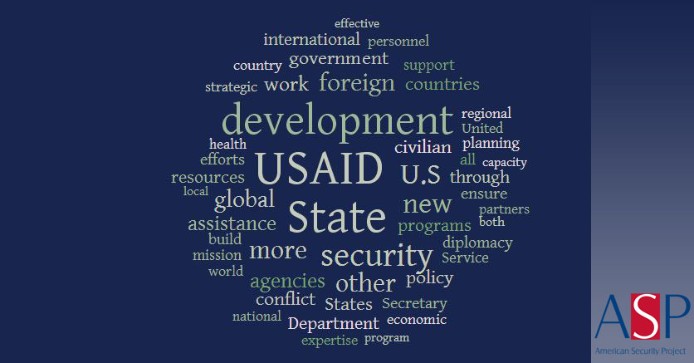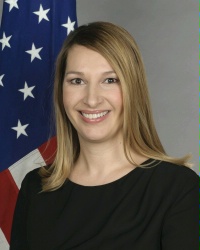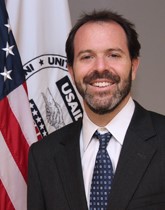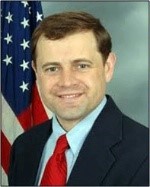
QDDR – Briefing Note | ASP
It has been four years since the publication of the 2010 QDDR. With the release of the 2014 Review close at hand, many still do not have a firm grasp on the impact of refocusing foreign policy to rely on civilian power.
Tomorrow, ASP will host a discussion with Deputy Secretary of State Higginbottom, Assistant Administrator Alexander Thier and Special Representative for the QDDR Thomas Perriello on the QDDR and how Congress can engage in this key review of U.S diplomacy and development strategy. The following briefing note provides a detailed, yet concise, summary of the background and structure of the QDDR, key outcomes from the 2010 publication, and what to expect in the upcoming 2014 release and how ASP can contribute to the process.
Short bios of tomorrow’s speakers can be found at the end of the note.
Quadrennial Diplomacy and Development Review (QDDR) – Briefing Note
Key Issues
- The QDDR is a joint-effort of the State Department and USAID
- Comprehensive assessment of both agencies, examining how they can be most effective, efficient, and successful in their work
- Modeled after the QDR to modernize the State Department and align resources, policies, and strategies
- First completed in 2010 and mandated by law to be completed every four years
- The 2010 Review expanded the scope and budget management capacity of the USAID by reorganizing existing agencies and projects, and establishing new organizations and programming
- First review focuses on organizational structure with some major strategy impacts, especially regarding climate change, energy security, national security strategy, and public diplomacy
- Included creation of Bureau of Energy Resources, Under Secretary of:
- Economic Growth, Energy and the Environment
- Civilian Security, Democracy and Human Rights positions
- Expanded the role of the Under Secretary for Arms Control and International Security Affairs with the creation of the Bureau for Arms Control, Verification, and Compliance and resurrection of the Bureau of International Security and Nonproliferation
Impact of 2010 Review
- Began rebuilding of USAID following the Foreign Affairs Agency Consolidation Act of 1998 to be the most prominent and innovative development organization in the world and outlined the revitalization of civilian power as a cornerstone of foreign affairs
- Significant portion addresses changes in organizational behavior- requiring lead agency designations for all projects and missions; strengthening monitoring and evaluation processes for programming, grants, and contractors; focus on developing best practices; expansion of USAID budget management capacity
- Also restructured key strategy- introduced a new planning process tying resources to strategic goals (ex. Specific programming focus on women and girls to further gender equity and human rights); commitment to expanding private sector, NGO, and global partnerships; building a “development diplomacy” approach at State
- Focusing development efforts on six key areas- sustainable economic growth, food security, global health, climate change, democracy and governance, and humanitarian assistance with a specific interest in women and girls in each area.
- This approach is widely expected to continue in the upcoming QDDR, particularly in areas relevant to ASP.
Purpose of the QDDR
- The QDDR catalogues strengths and successes and identifies areas for growth to contribute to the continuous improvement and modernization of America’s foreign affairs approach.
- The Review provides a short-, medium-, and long-term blueprint for diplomacy and development efforts to improve relevant institutions and redirect approaches that no longer adequately address current concerns.
- Its findings support and inform policy development, the allocation of resources, and the deployment of staff and authorities.
“The QDDR is not simply a review. It defines how to make diplomacy and development coordinated, complementary, and mutually reinforcing. It assesses what has worked in the past and what has not. And it forecasts future strategic choices and resource needs.” –Secretary Of State Hillary Rodham Clinton
Opportunities for ASP Impact
- The upcoming QDDR is expected to continue the work of its predecessor
- Approximately 15 of the 2010 QDDR’s outcomes focus on core ASP issues, specifically climate change, national security strategy, public diplomacy, and energy security
For example:
- Establishing a new Bureau for Energy Resources to unite diplomatic and programmatic efforts on oil, natural gas, coal, electricity, renewable energy, energy governance, strategic resources, and energy poverty
- Expand capacity to engage regionally, with regional embassy hubs as bases for experts on interdisciplinary issues like climate change
- Integrate security- and justice-sector assistance, and link that assistance to development by supporting programs that directly address host nations’ concerns, and emphasizing host ownership of those programs
- Public diplomacy as a core diplomatic mission
The QDDR as a Tool of Engagement
- The roles of diplomacy and development in addressing national concerns are often overlooked and misunderstood in the United States
- When asked to estimate the percentage of the federal budget allocated to foreign aid in a Kaiser Family Foundation study (2013), the median respondent answer is 28%
- 61% of respondents believe the U.S is spending too much on foreign aid
- However, foreign aid accounts for only 1% of the national budget– 2.6% including discretionary spending
- This underscores the general misinformation regarding diplomacy and development
- The public’s negativity toward allocating resources to foreign affairs makes elected officials less willing to support expanded efforts
- The QDDR is a unique opportunity to engage with Congress and other stakeholders on key ASP issues and combat misinformation, drawing attention to the important role of civilian power and garnering support for its expansion
QDDR Structure and Methodology
- The QDDR takes a systems approach to diplomacy and development and carefully enumerates::
- Baseline: assessment of current global threats, challenges, and opportunities and projections for next two decades to inform strategy; current status of diplomacy and development approaches, emphasizing relationship between the two in existing policies and structures
- Ends: statement of overarching foreign policy and development objectives, priorities, and expected results with an emphasis on the achievable, not just desirable
- Ways: strategy recommendations to achieve results, including timing/sequencing of decisions and implementation
- Means: recommendation of tools and resources needed to implement strategy, management and organizational reforms that will improve outcomes and efficiency.
- Metrics: set of recommendations on performance measures to asses outcomes and impacts
- Links: an assessment of how recommendations fit into inter-agency and whole government approaches, and the Administration’s foreign policy goals and framework
Speaker Biographies
Deputy Secretary of State for Management and Resources Heather Higginbottom is responsible for management and programmatic oversight at State and USAID. The advisor to the Secretary regarding the National Economic Council, Deputy Secretary Higginbottom assists the Secretary at international meetings and presents the Department’s position to Congress. Deputy Secretary Higginbottom has also served as the Deputy Director of the Office of Budget and Management, Deputy Assistant to the President and Deputy Director of the White House Domestic Policy Council, and the founding Executive Director of American Security Project. She earned a B.A in Political Science from University of Rochester and a Master’s in Public Policy from George Washington University. Deputy Secretary Higginbottom is the first female to hold the position of Deputy Secretary.
Alexander Thier is the Assistant to the Administrator for Policy, Planning, and Learning (PPL) at USAID. Established in June 2010 by the 2010 QDDR, PPL leads: USAID policy formulation and implementation; the revitalization of regional strategic planning; learning, evaluation, and research; and donor engagement. Thier served as the Assistant to the Adminstrator for Afghanistan and Pakistan affairs from 2010 to 2013, the Senior Rule of Law adviser and Afghanistant and Pakistan Director at U.S Institute of Peace and Director of the Project on Failed States at Stanford’s Center on Democracy, Development and Rule of Law. Thier also has several years of UN and NGO experience, including tmie as coordinator of the UN Iraq Program in New York. Thier earned his B.A from Brown University, a Master’s in Law and Diplomacy from Tuft’s Fletcher School and a J.D from Stanford Law.
Congressman Thomas Perriello was appointed Special Representative for the QDDR by Secretary Kerry in February 2014. Congressman Perriello represented Virginia’s 5th District from 2009 to 2011 and served on the Transportation and Infrastructure and Veteran’s Affairs Committees. A former Special Adviser to the Prosecutor of the Special Court for Sierra Leone, Congressman Perriello was also the CEO of Center for American Progress Action and Professor of transitional justice at UVA Law and University of Sierra Leone. Congressman Perriello is also a Counselor for Policy at the Center for American Progress and attended both Yale College and Yale Law School.
Maggie Feldman-Piltch is a public diplomacy and strategic communications intern at the American Security Project. She is a recent graduate of Wesleyan University with Honors in General Scholarship, where she completed an independently designed major in Theories of Ethics in Capitalism. You can follow her on twitter here.









[…] QDDR Briefing Note […]
[…] governments can meet the needs of their citizens, as the 2010 QDDR pointed out, is vital to American national security and combating global terror and transnational […]
[…] QDDR Briefing Note […]
[…] were identified as an opportunity for growth in the 2010 QDDR and are expected to remain in focus in the 2014 Review. Such partnerships allow the public and private sector to share risk, and planning and contribution […]